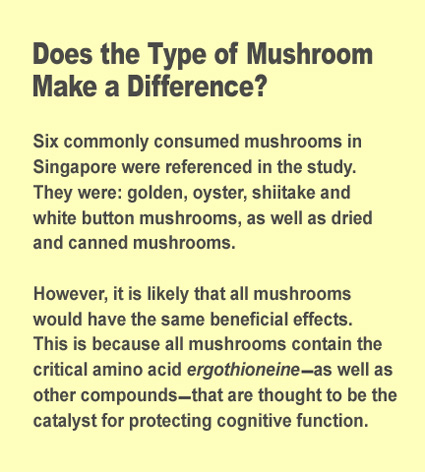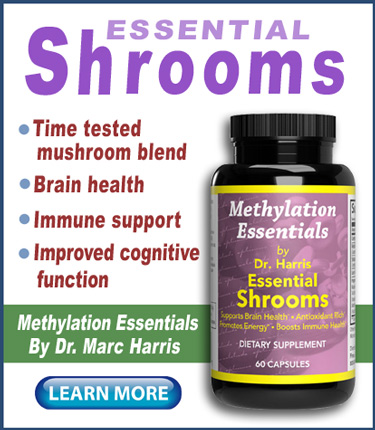If you were born in America, you probably heard “Eat your vegetables” on a regular basis when you were growing up. But if you lived in an Asian country, it’s more likely you heard “Eat your mushrooms!”
Now modern research is finding that mushroom consumption does, indeed, confer many health benefits—one of which is protection of cognitive function.
A 2019 study conducted in Singapore found that seniors who consumed more than two standard portions of mushrooms each week reduced their odds of developing mild cognitive impairment (MCI) by 50%.
A “portion” was defined as three quarters of a cup of cooked mushrooms with an average weight of around 150 grams. Two portions would be equivalent to approximately half a plate.
While the portion sizes act as a guideline, the researchers found that even one small portion of mushrooms a week is still beneficial in reducing the chances of MCI.
The study was conducted by a team from the Department of Psychological Medicine and Department of Biochemistry at the
Yong Loo Lin School of Medicine at the National University of Singapore (NUS). The results were published online in the Journal of Alzheimer’s Disease in March 2019.
The study was conducted over six years, from 2011 to 2017, and utilized data collected from more than 600 seniors over the age of 60 living in Singapore.
The researchers conducted extensive interviews and tests with the senior citizens to determine an accurate diagnosis.
After this, a two-hour standard neuropsychological assessment was performed, along with a dementia rating.
The overall results of these tests were discussed in depth with expert psychiatrists involved in the study to get a diagnostic consensus.
The results corroberated previous research on the cognition-supporting properties of mushrooms.
“It seems that a commonly available single ingredient could have a dramatic effect on cognitive decline,” said Assistant Professor Lei Feng, from the Department of Psychological Medicine at NUS, and the lead author of the study.
The researchers believe the reason for the reduced prevalence of MCI in mushroom eaters may be down to a specific compound found in almost all varieties.
“We’re very interested in a compound called ergothioneine,” said Dr Irwin Cheah, Senior Research Fellow at the Department of Biochemistry at NUS.
Ergothioneine is a naturally-occurring amino acid, but that’s just the basic definition: “ET is a unique antioxidant and anti-inflammatory which humans are unable to synthesize on their own. But it can be obtained from dietary sources, one of the main ones being mushrooms,” explains Dr Cheah.
Though ergothioneine is thought to be the most beneficial nutrient, the researchers noted other compounds contained within mushrooms may also be advantageous for decreasing the risk of cognitive decline. “Certain hericenones, erinacines, scabronines and dictyophorines may promote the synthesis of nerve growth factors,” the researchers wrote in the study summary.
According to the researchers, bioactive compounds in mushrooms may also protect the brain from neurodegeneration by “inhibiting production of beta amyloid and phosphorylated tau, and acetylcholinesterase.”
Unfortunately, mushrooms are not consumed regularly in western cuisine. Most westerners relegate mushrooms to the side as a garnishment, and food surveys indicate they are near the bottom of the list for kids’ favorite foods.
Fortunately, the same health benefits can be found in a quality mushroom supplement such as Essential Shrooms by Dr. Harris. Even people who already consume mushrooms regularly can benefit from the higher intake accomplished with supplementing.
Visit the Optimal Health Systems product info page, or click the sidebar banner, to learn more.
– – –
Sources: Journal of Alzheimer’s Disease / IOS Press, Yong Loo Lin School of Medicine.



